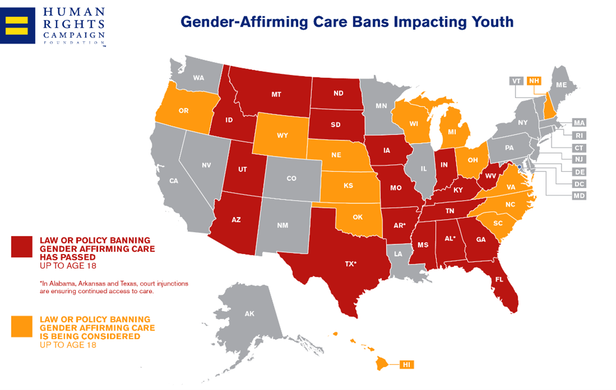|
By Dr. Marcus D. Smith, PhD, LCPC + Karli Bigler, M.A., LPC + Ziling Ni (倪子凌 in Chinese) Counselor In Training from Northwestern University
Recommendations:
Community & Federal Clinicians may want to partner with nonprofit organizations and explore community grants to enable free access to community care for Queer folk. Communities could also create local LGBTQ+ support groups and other supporting organizations that provide information, resources, and emotional connections and support to Queer individuals and their families. Academia Support research efforts that demonstrate the efficacy and safety of gender-affirming care. This data can be used to inform federal policies and challenge discriminatory practices. Clinician Clinicians should stay updated on the latest news and regulations of gender affirming care bans and consciously checking in with their clients about their current concerns or mental responses on related issues. Clinicians should actively collaborate with other professionals or providers who are supporting gender affirming care, which involves referring clients to supportive medical providers, legal experts, or community organizations, and have a resource list available for clients. Along the lines of additional professional development, clinicians should consider membership with organizations such as SAIGE (Society for Sexual, Affectional, Intersex, and Gender Expansive Identities) and WPATH (World Professional Association of Transgender Health) to increase knowledge and skills concerning standards of care. Clinicians may want to consider using integrative models to support clients externalize experiences of oppression as they are not innate. Also, these models would encourage clinicians to process with queer clients how they can cope with discrimination outside of an individualistic lens. For example, The Multiple Minority Stress Model (Rich et al., 2020) explores how prejudice and inequity of a queer persons’ identity impact how they cope with psychological, biological and social challenges. Clinicians should create and provide an open and safe counseling environment for clients to discuss topics or concerns related to gender-affirming care. Besides ensuring the confidential nature of the conversations and the limits of confidentiality, simple cues of always asking and using a client’s pronouns and self-identified names would contribute to a sense of validation and safety for transgender and gender non-conforming clients. Also, clinicians could display visible signs of inclusivity in the workspace, including transgender pride flags or artworks or books related to authenticity. Trans & Binary Persons Prioritize personal mental health by actively seeking support from therapists, clinicians, or community organizations specializing in gender identity issues. Stay informed about relevant mental and legal resources in local areas or those in more supportive states if possible. And educate oneself and practice self-care routines that promote emotional well-being. Find and join inside and outside supportive networks and groups, including friends, families, forums, online communities for Queer populations, and local LGBTQ+ groups, to strengthen ties, share personal experiences, and exchange resources. Engage in advocacy activities of awareness campaigns and educational events and share personal stories and experiences if comfortable to promote humanizing the issue and bringing it into public awareness. Reach out to community leaders, local representatives, or lawmakers to express concerns about the bans and the importance of gender-affirming care. Resources:
References:
0 Comments
Leave a Reply. |
Archives
April 2024
Categories |
Home
Follow us on social media: @CSJNational
|
|
© COPYRIGHT 2023. ALL RIGHTS RESERVED | COUNSELORS FOR SOCIAL JUSTICE IS A DIVISION OF THE AMERICAN COUNSELING ASSOCIATION
DOCUMENTS AND IMAGES ARE COPYRIGHTED, ONLY TO BE USED WITH PERMISSION.
DOCUMENTS AND IMAGES ARE COPYRIGHTED, ONLY TO BE USED WITH PERMISSION.

 RSS Feed
RSS Feed
